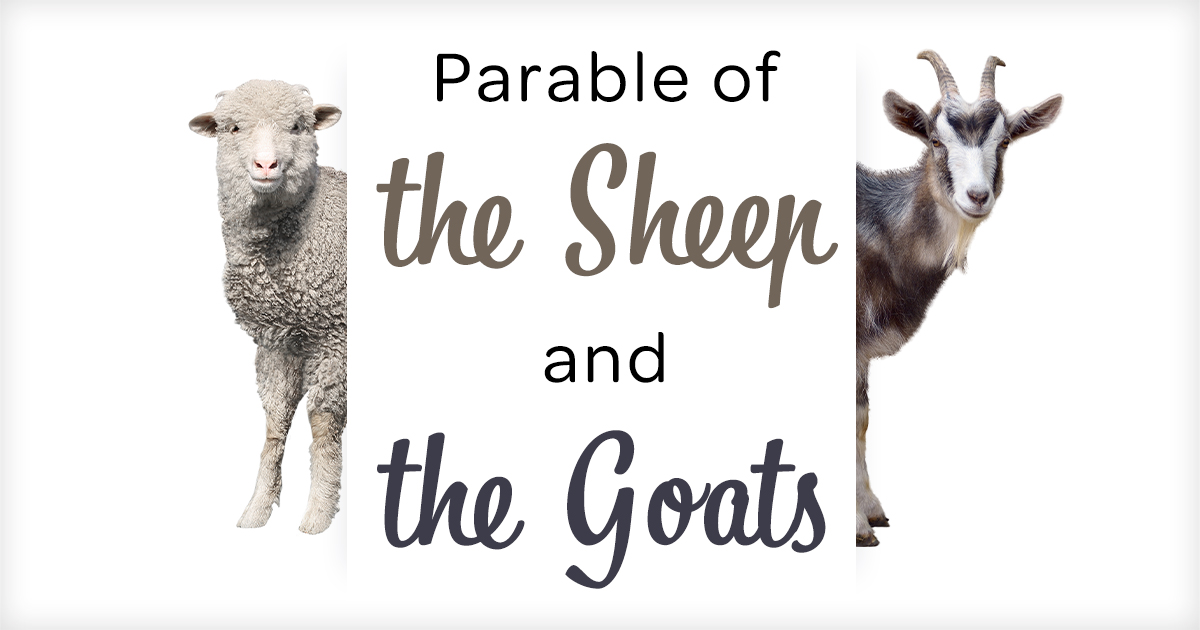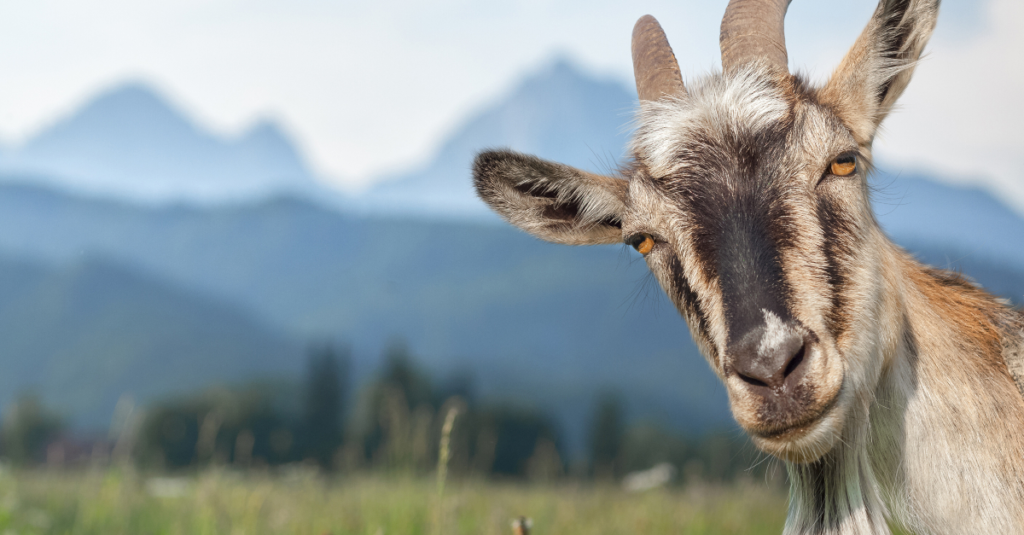
There are many Bible stories that involve goats and sheep, but this post will focus on the most popular ones. The first story involves Jesus and the Good Shepherd. In this story, Jesus says that he is the good shepherd and that his followers should also be good shepherds. They should take care of their sheep by feeding them, protecting them from danger, and leading them in the right direction. The second story involves David and his shepherds. In this story, David is described as a righteous king who was chosen by God to rule over Israel. He was also chosen to be a shepherd over God’s people Israel because he cared for them like a shepherd cares for his flock. The third story involves Jacob’s struggle with Esau over who would inherit their father’s blessing (Genesis 27:1-40).
You may find it hard to access the right information on the internet, so we are here to help you in the following article, providing the best and updated information on Goat And Sheep In The Bible. Read on to learn more. We at churchgists have all the information that you need about Goat And Sheep In The Bible.
Goat In The Bible
Introduction
Goats are mentioned many times throughout the Bible. They are often used as a symbol to describe someone who is stubborn, strong, or insensitive to the feelings of others. The goat is also a popular animal for sacrifice in the Bible and was often seen as an acceptable replacement for a lamb. Goats were important animals in biblical times because they provide meat and milk, as well as clothing from their wool.
Goat in Leviticus
Goat is mentioned in Leviticus. The Bible teaches that God called the goat to be a sacrifice for sin (Leviticus 10:17). It also teaches us that the goat can be used for food, clothing and other uses. The goatskin of the Tabernacle tent was made from goat leather (Exodus 25:5).
Sacrifice Of The Red Heifer
In the sacrifices of the Mosaic law, red heifers played a significant role. The red heifer was offered by the priest to atone for those who had become unclean because of touching a dead body. This sacrifice was performed so that they could be restored to fellowship with God and enter into His presence again in order to worship Him.
When this sacrifice was made, it had to be done with great care and precision. The animal had to be perfect; no blemish or defect could be found on it at all. It also had to have no spot or wrinkle on its body (Leviticus 19:2). If any broken bones were discovered later during examination by the priest when inspecting the animal before offering it as an acceptable sacrifice for sin, then it would not be accepted (Numbers 19:2-10).
Goats In Judges
He [Abimelech] took possession of his father’s [Saul’s] kingdom and ruled, but he did not retain the sovereignty for long. The Philistines soon gathered themselves together again under Achish son of Maoch, king of Gath… Now the spirit of the Lord had departed from Saul and an evil spirit from God troubled him. (1 Samuel 28:1-2)
As you may remember from our previous article about Saul, he was plagued by an evil spirit for most of his life until eventually being killed by it. In this passage we see that after defeating Goliath and becoming King David’s right-hand man, Saul is possessed by a demon which causes him to commit suicide rather than live without his power over Israel anymore. This story shows us how powerful these demons were because even someone like King Saul couldn’t resist their influence once they got control over him!
The Parable Of The Two Sons
The Parable of the Two Sons is a parable of Jesus found in Luke 15:11-32. In this story, there are two sons of a father who have different experiences when they go out into the world. The first son stays with his father while the second leaves home and squanders his inheritance on sinful living. When he realizes his mistake, he returns home to ask for forgiveness. His father welcomes him back with open arms and provides him with more than enough food to eat in celebration of their reunion.
The Parable of the Prodigal Son
In the parable of the prodigal son (Luke 15:11-32), a father has two sons. The younger son asks his father for his inheritance. When he receives it, he leaves home and squanders it on “riotous living.” He returns home several years later to find that his father has welcomed him back as if nothing had happened.
The parable ends with this statement: “And he [the father] said unto him [the older brother]: ‘Son, thou art ever with me, and all that I have is thine.'” Reading this story can encourage repentance in those who struggle with sin and feel shame over their past mistakes because they know that God is always ready to welcome them back home into His presence.
Other verses about Goats
Goats are mentioned more than 100 times in the Bible, more than any other animal. In fact, goats are mentioned more frequently than sheep, which is the next most often-mentioned animal at 84 times.
The Bible mentions over 100 different species of animals—and while I’m sure that it would be fun to count how many times each one appears (I can already tell you that cats and dogs take up a lot of real estate), let’s focus on goats for now.
Sheep vs Goat in the Bible
The Bible mentions goats and sheep many times. The Old Testament often refers to the “flock of goats,” while the New Testament refers to the “flock of sheep.”
Goats have been domesticated for millennia, and have been used for their milk, meat and skins since ancient times. While today they are most commonly thought of as pets or kept on farms as livestock, in biblical times they were also commonly used in religious ceremonies such as animal sacrifice (see Leviticus 1:10-13). It is believed that this practice came from ancient Hebrews who lived in Egypt before their exodus from Egypt under Moses’ leadership during 1450 BC. The Israelites took with them many animals including herd animals like sheep but also wild animals such as gazelles—both types were considered unclean by God himself because he gave his chosen people only those things which He had created themselves according to His own will rather than allowing them free reign over nature itself which could lead down dangerous paths later on like idolatry!
Goats are mentioned many times in the Old Testament of the Bible.
Goats are mentioned many times in the Old Testament of the Bible. Goats are mentioned in Leviticus, Judges, and the parables of the Prodigal Son and the Two Sons.
Goats are mentioned many times in the Old and New Testaments of the Bible. There’s no doubt that goats were important to the Israelites and Christians. Goats were considered to be unclean animals because they were not sacrificed for the purpose of atonement or purification, however, an exception was made for people who could not afford a sheep. Many times, these sacrificial goats represented imperfection and sinfulness that needed to be cleansed from us so we could be made clean again before God.
The story of Joseph shows us how much he loved his family despite their betrayal against him as well as how much forgiveness meant to him when his brothers came looking for food during famine years later.
Jesus uses many parables about goats, often using them as examples of those who will never enter into heaven unless they repent from their sins or choose another path in life other than what society expects them to do (like prostitutes).
“But whoever causes one of these little ones who believe in me to stumble, it would be better for him if a great millstone were hung around his neck and he were thrown into the sea.” – Matthew 18:6 ESV
Are you a sheep or a goat?
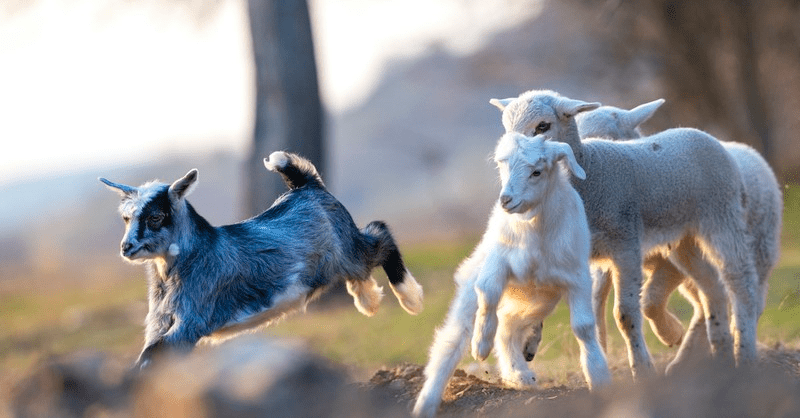
“When the Son of Man comes in His glory, and all the holy angels with Him, then He will sit on the throne of His glory. All the nations will be gathered before Him, and He will separate them one from another, as a shepherd divides his sheep from the goats. And He will set the sheep on His right hand, but the goats on the left” (Matthew 25:31-33).
These words picture the final judgment that will occur at the second coming of Christ. Each one of us will be present on that occasion. The Bible tells us, “for we must all appear before the judgment seat of Christ….” (2 Corinthians 5:10). You and I and every other person will be either on the right or left hand of Jesus. Those on the right hand, represented as sheep, are the saved. Those on the left hand, represented as goats, pictures the lost. To those on His right-hand Jesus, the King, will say, “…Come, you blessed of My Father, inherit the kingdom prepared for you from the foundation of the world” (Matthew 25:34). However, those on the left hand of the King will hear the words, “…Depart from Me, you cursed, into the everlasting fire prepared for the devil and his angels” (Matthew 25:41).
If the Lord came right now as you are reading this article, on which side of the Great Judge would you find yourself? Which of the words spoken by the King would be directed to you? Are you a sheep or a goat? Are you saved or lost?
Dear reader, are you aware that you are the one who decides whether you are a sheep or a goat? If you are saved it will be because you made the choice to accept the salvation God provides through the blood of Jesus (Romans 5:8-9). If you are lost it will be because you chose to reject God’s offer of salvation. You can choose to serve God in this life or to serve the devil. Your choice determines whether on the Day of Judgment you will be a sheep or a goat.
God wants you and every other person to be saved eternally (2 Peter 3:9). That is why He has revealed in His Word the exact response required to receive the forgiveness of sins. Faith in Jesus as the Son of God (John 8:24), repenting of sin (Acts 17:30), confessing faith in Christ (Matthew 10:32-33) and immersion in water for the remission of sins (Acts 2:38; 1 Peter 3:21) is what the Bible teaches is necessary to be saved. So, are you a sheep or a goat?
Bible Verses about Sheep And Goats
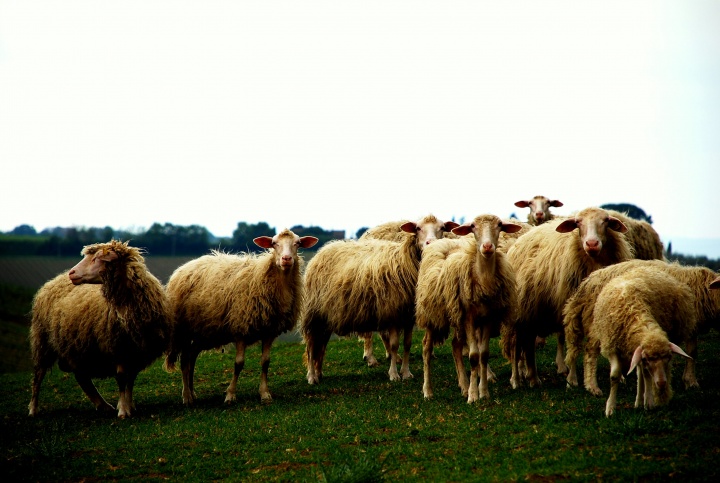
“Take the choicest of the flock,
And also pile wood under the pot.
Make it boil vigorously.
Also seethe its bones in it.”
Ezekiel 27:21
Arabia and all the princes of Kedar, they were your customers for lambs, rams and goats; for these they were your customers.
Ezekiel 34:17
“As for you, My flock, thus says the Lord God, ‘Behold, I will judge between one sheep and another, between the rams and the male goats.
Genesis 22:7
Isaac spoke to Abraham his father and said, “My father!” And he said, “Here I am, my son.” And he said, “Behold, the fire and the wood, but where is the lamb for the burnt offering?”
Genesis 22:8
Abraham said, “God will provide for Himself the lamb for the burnt offering, my son.” So the two of them walked on together.
Our Latest Videos
Leviticus 1:10
‘But if his offering is from the flock, of the sheep or of the goats, for a burnt offering, he shall offer it a male without defect.
Leviticus 3:6
But if his offering for a sacrifice of peace offerings to the Lord is from the flock, he shall offer it, male or female, without defect.
Leviticus 5:6
He shall also bring his guilt offering to the Lord for his sin which he has committed, a female from the flock, a lamb or a goat as a sin offering. So the priest shall make atonement on his behalf for his sin.
Numbers 6:14
He shall present his offering to the Lord: one male lamb a year old without defect for a burnt offering and one ewe-lamb a year old without defect for a sin offering and one ram without defect for a peace offering,
Exodus 12:3-10
Speak to all the congregation of Israel, saying, ‘On the tenth of this month they are each one to take a lamb for themselves, according to their fathers’ households, a lamb for each household. Now if the household is too small for a lamb, then he and his neighbor nearest to his house are to take one according to the number of persons in them; according to what each man should eat, you are to divide the lamb. Your lamb shall be an unblemished male a year old; you may take it from the sheep or from the goats.read more.
Exodus 12:21
Then Moses called for all the elders of Israel and said to them, “Go and take for yourselves lambs according to your families, and slay the Passover lamb.
Exodus 12:5
Your lamb shall be an unblemished male a year old; you may take it from the sheep or from the goats.
Numbers 7:17
and for the sacrifice of peace offerings, two oxen, five rams, five male goats, five male lambs one year old. This was the offering of Nahshon the son of Amminadab.
Numbers 7:23
and for the sacrifice of peace offerings, two oxen, five rams, five male goats, five male lambs one year old. This was the offering of Nethanel the son of Zuar.
Numbers 7:29
and for the sacrifice of peace offerings, two oxen, five rams, five male goats, five male lambs one year old. This was the offering of Eliab the son of Helon.
Numbers 7:35
and for the sacrifice of peace offerings, two oxen, five rams, five male goats, five male lambs one year old. This was the offering of Elizur the son of Shedeur.
Numbers 7:41
and for the sacrifice of peace offerings, two oxen, five rams, five male goats, five male lambs one year old. This was the offering of Shelumiel the son of Zurishaddai.
Numbers 7:47
and for the sacrifice of peace offerings, two oxen, five rams, five male goats, five male lambs one year old. This was the offering of Eliasaph the son of Deuel.
Numbers 7:53
and for the sacrifice of peace offerings, two oxen, five rams, five male goats, five male lambs one year old. This was the offering of Elishama the son of Ammihud.
Numbers 7:59
and for the sacrifice of peace offerings, two oxen, five rams, five male goats, five male lambs one year old. This was the offering of Gamaliel the son of Pedahzur.
Numbers 7:65
and for the sacrifice of peace offerings, two oxen, five rams, five male goats, five male lambs one year old. This was the offering of Abidan the son of Gideoni.
Numbers 7:71
and for the sacrifice of peace offerings, two oxen, five rams, five male goats, five male lambs one year old. This was the offering of Ahiezer the son of Ammishaddai.
Numbers 7:77
and for the sacrifice of peace offerings, two oxen, five rams, five male goats, five male lambs one year old. This was the offering of Pagiel the son of Ochran.
Numbers 7:83
and for the sacrifice of peace offerings, two oxen, five rams, five male goats, five male lambs one year old. This was the offering of Ahira the son of Enan.
Numbers 7:88
and all the oxen for the sacrifice of peace offerings 24 bulls, all the rams 60, the male goats 60, the male lambs one year old 60. This was the dedication offering for the altar after it was anointed.
Ezra 6:17
They offered for the dedication of this temple of God 100 bulls, 200 rams, 400 lambs, and as a sin offering for all Israel 12 male goats, corresponding to the number of the tribes of Israel.
Matthew 25:32
What Is the Difference Between Sheep and Goats?
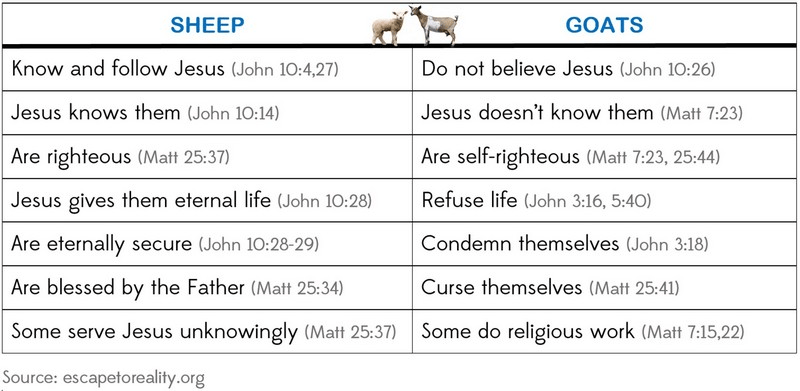
God apparently has very different opinions of two groups of people He calls “sheep” and “goats.” But what is it about sheep and goats that makes such a big difference? And how can we know which we are?
I am not, nor have I ever been, a shepherd. My familiarity with sheep and goats ends after cartoon characters and mattress commercials. So many times, I feel like scriptures involving the concept of God’s Church being a flock, or of us being His sheep, or even of Jesus being a lamb go right over my head. For instance, in Matthew 25, this analogy, which is obviously included to help me understand something more, just left me more confused:
“When the Son of Man comes in his glory, and all the angels with him, then he will sit on his glorious throne. Before him will be gathered all the nations, and he will separate people one from another as a shepherd separates the sheep from the goats. And he will place the sheep on his right, but the goats on the left. Then the King will say to those on his right, ‘Come, you who are blessed by my Father, inherit the kingdom prepared for you from the foundation of the world’ . . . Then he will say to those on his left, ‘Depart from me, you cursed, into the eternal fire prepared for the devil and his angels’ . . . ‘And these will go away into eternal punishment, but the righteous into eternal life’ (Matthew 25:31-34, English Standard Version).
So for us to be God’s sheep, we must depend on Him to defend us. If we push, take, destroy and bully, we are goats.
Why are the sheep and goats separated? Why are sheep better than goats? Why does one earn reward and the other earn punishment? How do I make sure I am not a goat? What if I already am a goat, and I don’t know it? The analogy continues to describe the works of the sheep versus those of the goats, but why? What inward difference produces such different outcomes?
I did a little research. Here is what I learned.
Fun facts: In North America, sheep and goats are easily distinguishable, due to specialization through breeding. Sheep are fluffy and wooly; goats are not. However, throughout history, and still today in parts of Asia and Africa, sheep and goats are almost identical, and no one but a shepherd can easily tell the difference. So the application here for the parable would be that outward conformity (being part of the herd) isn’t all that’s required of us. There is something that only our Shepherd can see in us, and that unseen thing tells God whether we are sheep or goats. It determines whether God sorts us to the left or to the right.
But what is it? I needed more research.
I learned that sheep have a reputation for being stupid and just sort of worthless (bummer!) However, again, the sheep of today are much different than sheep as they were created. Again, they have been bred in such a way as to produce fluffier, dumber sheep. But they are, and have always been, dependent on their shepherd and defenseless. Goats, on the other hand, have a reputation for being independent, opinionated and curious at best—or vulgar, dangerous and destructive at worst.
Here are some fun quotes about goats from a livestock forum: “If you leave goats in with your horse, they may chew off his tail.” “My dad has described goats as ‘Jack Russells with hooves.’” “If your fence won’t hold water, it won’t hold a goat.” And about 50 testimonies of goats climbing and butting cars.
So I would boil all that down this way: Shepherds protect sheep from their environment, whereas goatherds protect the environment from their goats. So for us to be God’s sheep, we must depend on Him to defend us. If we push, take, destroy and bully, we are goats.
The main thing though—the central difference between sheep and goats—is really simple. It’s an idea that we can come back to when we need to stay on track: A sheep is led by its shepherd. A goatherd is led by his goat.
Literally! Sheep follow the voice of their shepherd and trust him to lead them to food, water and safety. If they wander, which some do, the shepherd will go out and rescue them and bring them back to the safety of the flock. Sheep separated from their shepherd and flock are nervous and vulnerable because they have no defensive or offensive survival abilities.
A goat, however, doesn’t follow anyone. A herd of goats goes where it wants, and the goatherd follows behind. Instead of grazing, goats “browse”—foraging for whatever strikes their fancy. So that tells us that if we are allowing ourselves to be led, being sensitive to the pull of God’s Spirit, and following the path of our Shepherd, we are sheep. If we are headstrong, going our own way, and pulling back against God’s Spirit, we are goats.
So the thing that God sees in His sheep is a gentle and yielded spirit. They trust their Shepherd. They follow His voice. On the other hand (pun intended), the goats have a spirit of defiance, self-will, or independence from God’s involvement in their lives.
So now that you know these things, how are you feeling? Are you more of a sheep or more of a goat?
If you are like me, some days you feel a little more goatish than others. So is that it? Are we doomed?
What I see from all of these concepts, and what I think the analogy is meant to convey (when you know at least something about sheep!) is that it’s something we can change right now! I can choose—and you can choose—to be led. We can learn to recognize our Shepherd’s voice and to trust it.
Here are three things you can do to help.
1. Get in God’s Word every day.
Whether it’s a reading plan, a verse-of-the-day app, or listening to gospel music in the car or while you run, make God’s Word a part of your routine. Even if you just flip open your Bible before bed and read for five minutes, do something, and do it every day. Start small and then let it grow! The more familiar you make yourself with the voice of your Shepherd, the more easily you can recognize it.
2. Take time to pray.
Pray about little things, big things, silly things. Prayers don’t have to be long or formal. When you see something beautiful, say, “Thank you, God!” When you are moved to tears or giggles, just tell Him about it. When you don’t understand something, just let Him know. Develop trust in your Shepherd by sharing your fears, your hopes and your needs with Him.
3. Take time for quiet.
Take time to listen. When life gets chaotic and confusing, and you don’t know which path to take, pause and listen. What scriptures come to mind? Has God helped you with something similar in the past? Ask God to inspire you with His Holy Spirit. In my experience, if you ask, He always will! The more you pray and saturate your mind with God’s words, the more you will be able to recognize His voice above the voice of the crowd.
Make the choice. Take the steps to be a sheep and not a goat.
